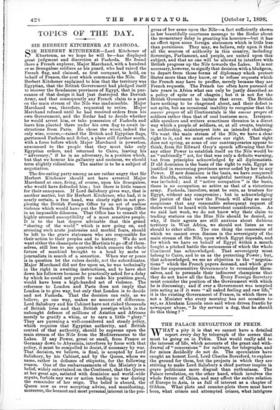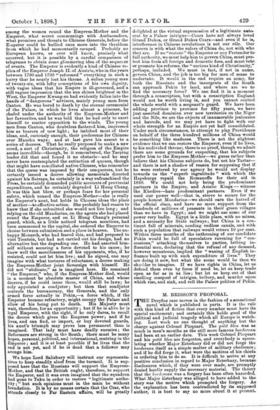THE PALACE REVOLUTION IN PEKIN.
WHAT a pity it is that we cannot have a detailed report every day by telegraph of the scenes that must be going on in Pekin. That would really add to. the interest of life, which accounts of the grant and with- drawal of " concessions " for railways, for telegraphs, and for mines decidedly do not do. The speculators have caught an honest Lord, Lord Charles Beresford, to explore the ground for them, but the projects in which they are striving to make Lord Salisbury a chief partner inspire in grave politicians more disgust than enthusiasm. The Palace revolution, on the other hand, which involves the whole future of China, and may affect the entire relation of Europe to Asia, is as full of interest as a chapter of Gibbon. What plots and counter-plots there must have been, what crimes and attempted crimes, what intrigues among the women round the Empress-Mother and the Emperor, what secret communings with Ambassadors, what promises and threats to Chinese Generals, before the Emperor could be bullied once more into the thraldom from which he had momentarily escaped. Probably no European knows, or ever will know, precisely what occurred, but it is possible by a careful comparison of telegrams to obtain some glimmering idea of the sequence of events. The Emperor is evidently a kind of Chinese re- plica of the Emperor Joseph II. of Austria, who in the years between 1780 and 1790 " reformed " everything in such a hurry that he nearly lost his throne. A sullen young man of twenty-six, with lofty conceptions of his own dignity, with vague ideas that his Empire is ill-governed, and a still vaguer impression that the sun shines brightest in the West, the Emperor Kwang-su had evidently fallen into the hands of "dangerous" advisers, mainly young men from Canton. He was bored to death by the eternal ceremonial of the Palace, in which he lives almost a prisoner, he chafed under the authority of the Empress-Mother and her favourites, and he was told that he had only to exert himself to scatter opposition to the winds. The young men from Canton, who doubtless flattered him, impressed him as bearers of new light ; he imbibed most of their ideas, and, curiously enough, their preference for Chinese over Manchu ways ; and at last gave his assent to a series of decrees. That he really purposed to make a new creed, a sort of Christianity, the religion of the Empire seems incredible—though, be it remembered, the Taeping leader did that and found it no obstacle--and he may never have contemplated the extinction of queues, though that might have conciliated native Chinese, who remember that the queue was imposed by their conquerors, but he certainly issued a decree allowing memorials directed against his Satraps, he certainly in a way enfranchised the Press, he certainly demanded public accounts of provincial expenditure, and he certainly degraded Li Hung Chang. It was this last blow, or perhaps fears for her personal safety, which roused the Empress-Mother—she is really the Emperor's aunt, but holds in Chinese ideas the place of mother—to effective action. She probably had reason to know that if she submitted she would not live long ; and relying on the old Mandarins, on the agents she had placed round the Emperor, and on Li Hung Chang's personal guard, which, as a little noticed telegram mentions, had been summoned to the capital, she ordered the Emperor to choose between submission and a place in heaven. The un- happy Monarch, who had feared this, and had proposed to visit Tientsin, but had not carried out his design, had no alternative but the degrading one. He had asserted him- self without securing a force devoted to his cause ; he knew well the mercilessness of his opponents, who, if he resisted, could not let him live ; and he signed, one may imagine with what tortures of reluctance, a decree making the Empress-Mother joint Sovereign with himself. He did not " abdicate," as is imagined here. He remained " the Emperor," who, if the Empress-Mother died, would in a moment be absolute master of China, and whose decrees, if he could issue them, would still be laws; he only appointed a coadjutor ; but then that coadjutor controls the bureaucracy, the Generals, and the only armed force actually in Pekin,—a force which, if the Emperor became refractory, might occupy the Palace and allow of his being put to death. His Majesty must wait, therefore, for an opportunity ; but if he is alive he is legal Emperor, with the right, if he only dares, to recall the decree which gives the Empress power ; and if he lives, and can find, or import, or buy devoted guards, his aunt's triumph may prove less permanent than is imagined. That lady must have deadly enemies ; the Reformers are strong in the South ; there must be many hopes, personal, political, and international, centring in the Emperor ; and it is at least possible if he lives that the end is not yet, and if he is dead that a follower may avenge him.
We hope Lord Salisbury will instruct our representa- tives to keep steadily aloof from the turmoil. It is sup- posed here that the Russians will support the Empress- Mother, and that the British ought, therefore, to support the Emperor, and it was even imagined that the squadron had gone to Taku in order to restore " legitimate autho- rity ; " but such opinions must in the main be without foundation. It is by no means certain that the Czar, who attends closely to Far Eastern affairs, will be greatly delighted at the virtual supersession of a legitimate auto- crat by a Palace intrigue—Czars have not always loved Grand Dukes, or Grand Dukes Czars—and even if he is, interference in Chinese revolutions is not our role. Our concern is with what the rulers of China do, not with who they are. If we "restore" the Emperor or any Pretender to full authority, we must help him to govern China, must pro- tect him from all foreign and domestic foes, and must veto- or promote his reforms, the " curious kind of Christianity," perhaps, included. We must in fact, if not in name, govern China, and the job is too big for men of sense to undertake. It would in the end require an army, for both the Russians and the insurgents of the South can approach Pekin by land, and where are we to find the necessary force? We can find it in a moment through a conscription, but with a conscription England, would not be worth living in, and you cannot control the whole world with a sergeant's guard. We have been adding province to province for fifty years, we have just asserted dominion over new territories on the Niger and the Nile, we are the objects of innumerable jealousies and hatreds, and we may yet have to fight with our whole strength for an Empire not yet half consolidated. Under such circumstances, to attempt to play Providence on behalf of the three hundred millions of China would be something like madness. There is not the slightest evidence that we can restore the Emperor, even if he lives, to his undivided throne; there is no proof, though we admit there are some grounds for suspecting, that his subjects prefer him to the Empress•Mother—we guess rather than believe that his Chinese subjects do, but not his Tartar— and there is not a shadow of reason for supposing that if he were restored by our agency he would not display towards us the " superb ingratitude " with which the Hapsburgs repaid the Romanoffs for their aid in 1848. We could not help being the predominant partners in the Empire, and Asiatic Kings — witness the Khedive—hate predominant partners. Even if we used our power well—that is, strove to secure for the people honest Mandarins—we should earn the hatred of the official class, and have no more support from the hundreds of millions of peasants in their green villages than we have in Egypt ; and we might use some of our• power very badly. Egypt is a little place, with no mines, and a necessity fur State railways ; but China is a con- tinent full of minerals, needing endless canals, and with such a population that railways would return 10 per cent. Within three months of the enthroning of our candidate Pekin would be full of speculators ravening for " con- cessions," attaching themselves to parties, bribing in- fluential men, declaring that the refusal of any demand, however monstrous, implied the " waning of lJnglish in- fluence built up with such expenditure of lives." They are doing it now, but what the scene would be then we shedder to imagine. If we have rights in China, let us, defend them even by force if need be, let us keep trade open as far as in us lies ; but let us keep out of that smelling cesspool of intrigue, bribery, and murder upon which rise, and sink, and roll the Palace politics of Pekin.







































 Previous page
Previous page